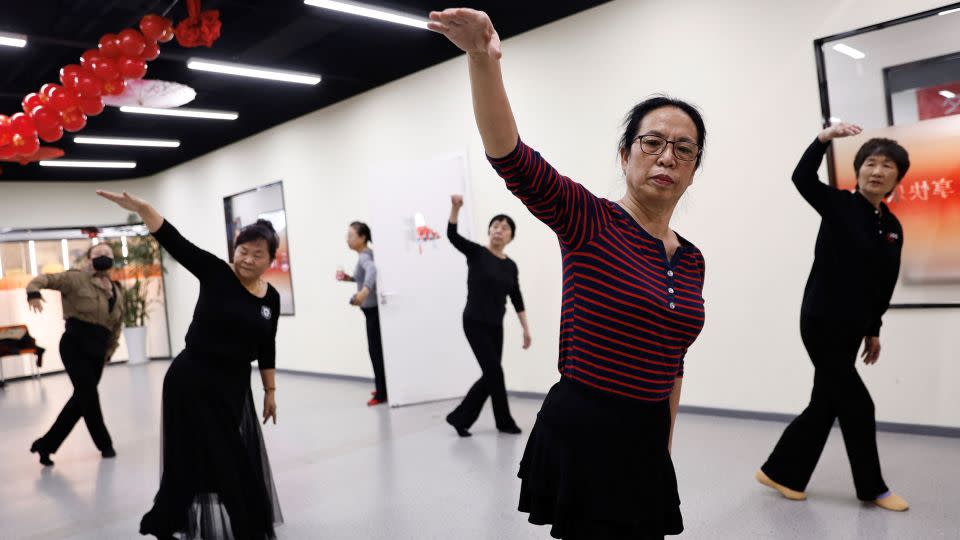China has announced plans to raise some of the world’s lowest legal retirement ages as it tries to deal with the fallout from the a rapidly aging population It is a pension funding crisis.
Currently, men in urban areas can retire at age 60 and receive a pension from state-supported funds. The retirement age for urban female workers is 50 or 55, depending on their occupation. Rural residents in China are subject to a different retirement system.
Beijing’s plans, announced over the weekend, have already generated a violent reaction.
“In accordance with the principles of voluntariness and flexibility, [we] will advance in a steady and orderly manner the reform of the progressive postponement of the legal retirement age,” the ruling Communist Party of China said on Sunday.
The plan, along with some other important reforms, were released in a resolution three days after the country’s leadership finalized the China deal. third plenarya major political gathering in Beijing that takes place every five years.

Battling a declining birth rate and aging population, China’s policymakers have been talking about raising the retirement age for more than a decade.
At the 2013 plenary, a highest decision-making body of the Communist Party said it had become necessary to “study and formulate” a policy to delay the retirement age. Eight years later, during the height of the Covid-19 pandemic, China’s cabinet included the policy in its next five-year plan, meaning the changes could come into force before 2025.
Although the government did not announce any details over the weekend, a December report by the Chinese Academy of Social Sciences, a leading government think tank, estimated that everyone will eventually retire at age 65.
In 2019, the same think tank predicted that China’s state pension fund would run out by 2035 due to its shrinking workforce. Years of strict restrictions related to the pandemic, which shrunk local government cofferscould make the pension deficit even more dire.
At the beginning of last year, thousands of elderly protested in several large cities against major cuts in their medical benefit payments, fearing that local governments were dipping into their individual accounts to cover shortages in the state pension fund.
Anger on social media
Chinese media reacted angrily to the changes to the retirement age, with many expressing their displeasure at the prospect of delayed access to their pensions. Younger people also complained that they would have fewer jobs if older workers stayed in the job market longer.
On Weibo, the hashtag “advance retirement age postponement reform” has been a top trending topic since Sunday.
One of the most liked comments said: “Be aware: delaying the retirement age only means that you will not be able to receive your pension until very late. That doesn’t guarantee you would still have a job before then!”
“Young people have difficulty finding a job, but the elderly cannot retire. What are you doing? How can [you] dare you encourage people to have three children?” commented another Weibo user, referring to the government’s plans to boost China’s dwindling population.
China’s youth unemployment rate has risen reached historic highs after the Covid-19 pandemic. Even after restrictions have been lifted, employers continue to pull back on hiring as the economy slows.
The government radical repressions in sectors ranging from technology and property to private tutoring, which were once the biggest hirers of college graduates, have eliminated many jobs available on the market. A structural incompatibility has exacerbated the problem as graduates opt for white-collar jobs over blue-collar jobs while factories struggle to hire workers.
The lack of quality jobs could deepen China’s population crisis. Although the government has relaxed the limit on the number of children allowed per couple, launched national campaigns by encouraging families to have more children and offering financial sweeteners, Chinese people’s willingness to have children is almost the greatest lowest in the world.
The country’s population has has shrunk in the last two yearswith 2023 marking the lowest birth rate since the founding of communist China in 1949. Last year, China was surpassed by India as the most populous country in the world.
On Xiaohongshu, the Chinese equivalent of Instagram, the hashtag “retirement age” also attracted around 100 million views as of Tuesday morning.
“Delay retirement age on a ‘voluntary basis’? Just like the older generation was “voluntarily” forced to have just one child or fired from state-owned companies?” he said a Xiaohongshu user.
For more news and newsletters from CNN, create an account at CNN.com



































